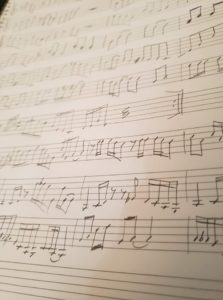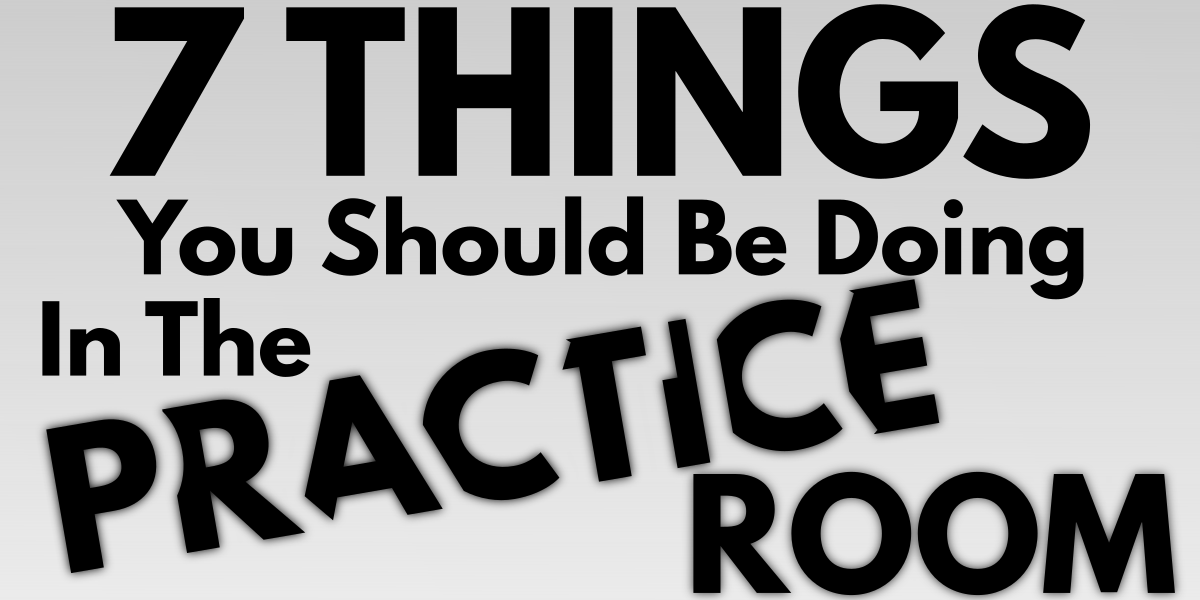7 Things You Should Be Doing In The Practice Room
When new students come to us for lessons, one of the first things we do is make sure they know not just what to practice, but HOW to practice. The practice room is the place where you’re going to be spending lots of time honing ideas, practicing technique, learning tunes, and many other things. You as the player should have your time and goals logged in, and know exactly what you’re trying to accomplish in the time you’re working. Otherwise, you may find you are not progressing anywhere, and you’re in a rut as a player.
In this article, we’re going to outline 7 things you should be doing in the practice room, every time you sit down, no exceptions!
Why Should You Care?
There are always students who prefer to ‘learn things their own way’. There is nothing wrong with this approach. We have seen many students who prefer to spend long periods of practice time learning their own way, only to find that our way was how they should be doing it all along.
Remember, you can’t do anything big without a plan. If you think you can, you’ll likely be back to planning, after failing to not have a plan to begin with.
One - Use A Metronome
Yes, it is true that roughly 80% of students hate using the metronome. Young adult students, and especially Adult students! They hate it!
One of the biggest reasons they hate the metronome is it immediately points out the flaws in their playing. It becomes totally obvious where they need to place their efforts, and because of this, the student ends up feeling bad about their own playing. Even if the piece they’re working on is totally learned and memorized, there is a strong possibility that using the metronome will highlight some trouble spots.
These issues with lack of confidence, also mentioned in a previous article here are a killer to progress. If you have a tool at your disposal that can highlight your biggest weaknesses, then why aren’t you using it?
Instead of feeling bummed out that you found a place you make mistakes, now, you know exactly where to spend your effort. You know 100% where you need to practice!
Two - Playing Through Tension - Don't
Practicing with too much tension can be a real detriment to your guitar playing. Always remember, we are activating small muscles here, not big ones. We are not trying to club our way through a wall. Tension is the enemy.
If you practice and find your joints locking up, your shoulders, your feet, any other body part, you are playing with way too much tension.

Three - Not Having Enough Stuff To Practice
If half your practice time is spent screwing around on the internet, watching guys on youtube, or trying to absorb lots of content, you’re practicing wrong. In our DGA Mastermind Facebook Group, we constantly preach the idea of knowing what you know really well (more on this in the next paragraph).
The truth is that you don’t need lots of things to practice, but you do need a plan and you have to be consistent enough to stick to it in order to see progress.
If you are beginning on guitar and have no idea where to begin, we recommend our Strumming Pattern Ebook, which is totally free.
In this book, there are directions on how to take the material, and make more and more material out of it.
Four - Not Knowing What You Thought You Knew
Ok, you know how to play all your modes and scales at 220 bpm. You know how to sweep pick arpeggios all over the place. You’ve got your tapping game down packed. Now what?
The question is this, can you actually USE all of this information you’ve been feeding yourself in order to become a better player?
If you have a grasp on a concept, be a scale, or lick, or something of that nature, can you use it in your own music? Can you improvise using this concept? Do you know how to apply what you know, not just verbatim, but combined in unique ways with other musical language?
If the answer is no…..then… take a look at number 5.

Five - A Plan That Changes Too Often
In another article, we talk about some of the issues beginners face playing guitar. One of the biggest issues is having no plan, but somehow expecting to see improvement. It is true that blunt force practicing will bring improvement, but you will get more results by having a plan and sticking to it consistently over time.
So, having no plan is bad right? How about a plan that changes week to week? That is just as bad. If your plan in the practice room changes every week, how do you expect to ever have any material fully absorbed? Ask yourself, “can I use what I’m learning? Do I know it well enough to use it?” If the answer is no, you should keep what your practicing in your schedule until you really know it effortlessly.
Six - Not Warming Up
You should make it a point to warm up every time you practice on the guitar. Just like you would not try to run a marathon without stretching your legs, you should avoid playing for long periods of time without first ‘stretching’ your fingers, arms, body, and getting ready for a practice session.
A tried and true easy method is to simply practice scales or simple things at a moderate tempo for about 10 minutes, or longer if it’s cold, until you feel significantly warmed up and ready to roll.
Seven - Practice Sight Reading
Even if your goals as a player do not include studio work, session work, playing in paid bands as a cover guy, weddings, corporate gigs, theater, or teaching, you should still make an effort to learn to read music.
You should consider learning the language of music essential to your understanding of it as a player. The deeper your understanding, the more you improve yourself as a player. Beginners can always start with our ebook, and work forward from there!
Rock and Metal guys avoid learning reading and theory the same reason younger students avoid the metronome. They fear their own inadequacy as players. But, you really should practice some humility here. If you find a place in your playing where you lack skill, that is where you should spend way more time!

Conclusion
We hope these tips help musicians of all walks.
These are just some of the tips we provide students on how to become the players they want to be!
Thanks for reading!






